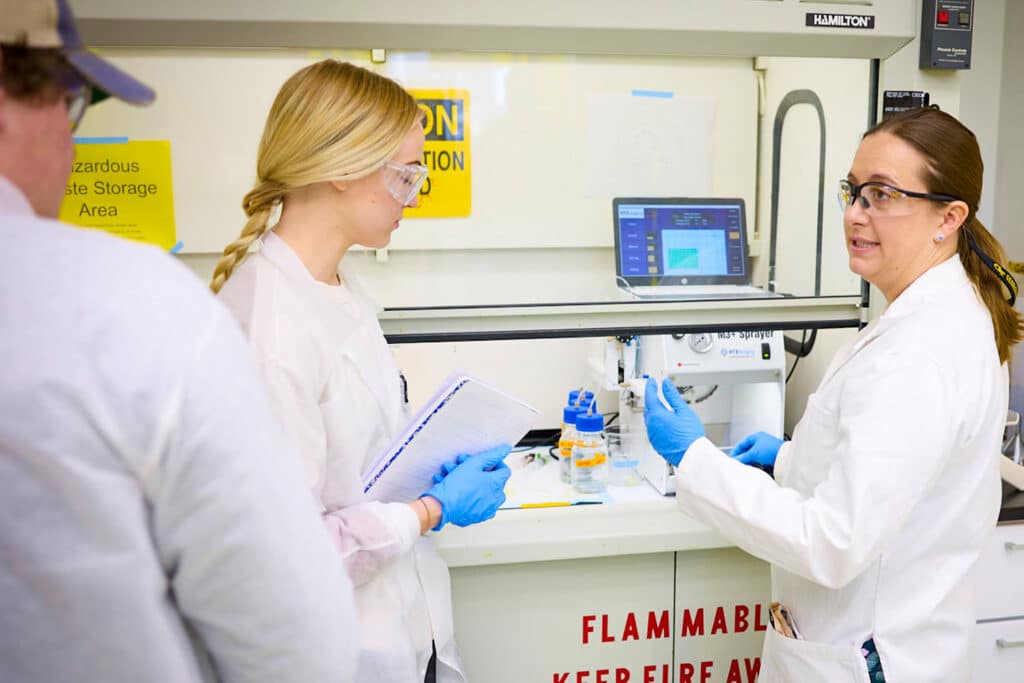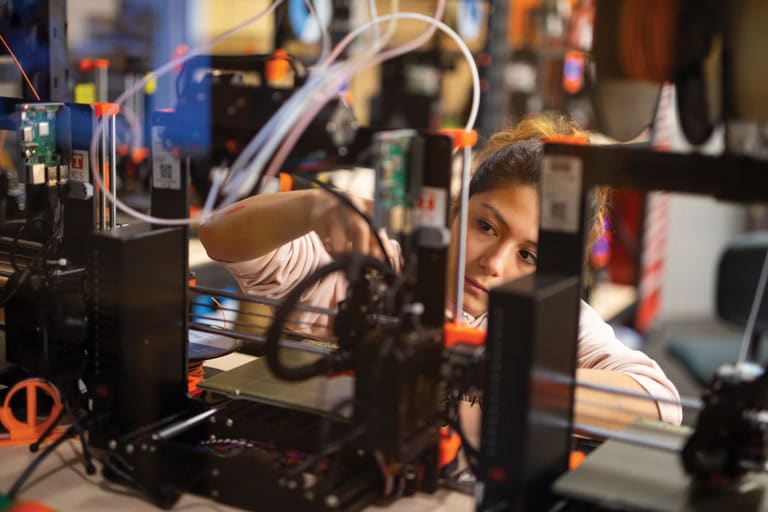
Biomedical Engineering, MS
The medical field has taken huge strides in recent years, with biomedical engineers playing a critical role in cutting-edge technology and research advancements for enhancing lives. Students pursuing an MS in biomedical engineering have a unique opportunity to be instruments of change in a field dedicated to improving patient outcomes, making biomedical engineering a compelling and fulfilling field of study.
Program overview
Our biomedical engineering program provides high-level research opportunities for grad students to hone expertise in their chosen field. Students can pursue one of three routes of study: a traditional thesis option, a project option consisting of independent research experience with a written report, or a coursework-only option with examination. Core research is in the following areas:
- Brain computer interface robotics for healthcare and other applications
- Artificial synapses for brain-inspired computing
- Wearable technology for healthcare and rehabilitation
- Upper limb prosthesis and exoskeletons, biomechanics, and neuromuscular control
- Biomaterials, drug delivery, and device design
Concentrations
Students pursuing their graduate degree in biomedical engineering have several concentrations to choose from including:
- Biomechanics
- Dual MS-MBA Program
- Materials
- Nuclear Space Science and Engineering
- Robotics
- Theranostics
Why Study Biomedical Engineering at UT?
The University of Tennessee, Knoxville, offers several unique opportunities for students who wish to pursue a graduate degree in biomedical engineering, including research collaborations with both government and industry partners. Our world-renowned faculty are experts in their field.
Nationally Recognized
Our program is ranked as the 49th best public graduate program in the nation, according to U.S. News and World Report. As a field of study with one of the highest percentage of females in engineering, biomedical engineers are some of the most diverse in their field.
Facilities and Partnerships
Our department collaborates with the UT Medical Center, Graduate School of Medicine, College of Veterinary Science, Oak Ridge National Laboratory, and other engineering departments for a more robust academic experience. In addition, students have access to top-quality studios for design, manufacturing, and testing biomedical devices, as well as the SynDaver (synthetic cadaver) Laboratory, the first of its kind in an engineering department.
What can you do with a MS in Biomedical Engineering after graduation?
An MS in biomedical engineering opens the doors to careers in a variety of health-related professions, including medical device manufacturing, regulatory governmental agencies, healthcare technology, clinical engineering, and more. Many graduates chose to continue on to medical school.
Featured Courses
Below are some of the courses that students in our program can choose to take. For a full list of courses, visit the graduate catalog.
BME 560 Tissue Engineering and Regenerative Medicine
Develop an understanding of cell-cell interactions and the role of the extracellular matrix in the structure and function of normal and pathological tissues. Topics include the harvesting of stem cells from specific tissues, the use of artificial and natural scaffolds in three-dimensional tissue culture, and the role of maintaining the stem cell state in culture.
BME 570 Healthcare Engineering
Introduction to fundamentals of health care delivery from an engineering perspective, for example clinical pathway optimization, operating room efficiency, impact of multidisciplinary preoperative patient education and other healthcare policy decisions on healthcare delivery cost and efficacy.
BME 573 Biomechanics of Hard and Soft Tissue
Introduction to terminology, physiology, and analytical methods for mechanics of living tissue. Continuum mechanics analysis of hard and soft issue, biological fluid flows. Flow properties of blood, rheology of blood in micro vessels; bioviscoelasticity of fluids and solids, mechanical properties of blood vessels; skeletal, heart and smooth muscle; bone and cartilage. Research paper.
BME 588 Cell and Tissue-Biomaterials Interaction
Study of the fundamental principles involved in materials / cell and tissue interactions. Students will learn the underlying cellular and molecular mechanisms in host response to biomaterials. Emphasis will be placed on the integration of biomaterials/neuronal cells and tissue interactions into the design of neural implants
Related Programs
Check out a list of related programs to look into based on your interest in biomedical engineering:
Admissions and Aid
Choosing the right university to pursue an engineering degree is an important decision—and a significant investment. We want to make sure that you have the information you need to both apply and make attending UT affordable.


Ready to Join Us?
See yourself on Rocky Top? We’ve made it easier than ever to apply for admission. Learn more about our admission requirements and the steps to apply to be an Engineering Vol.
